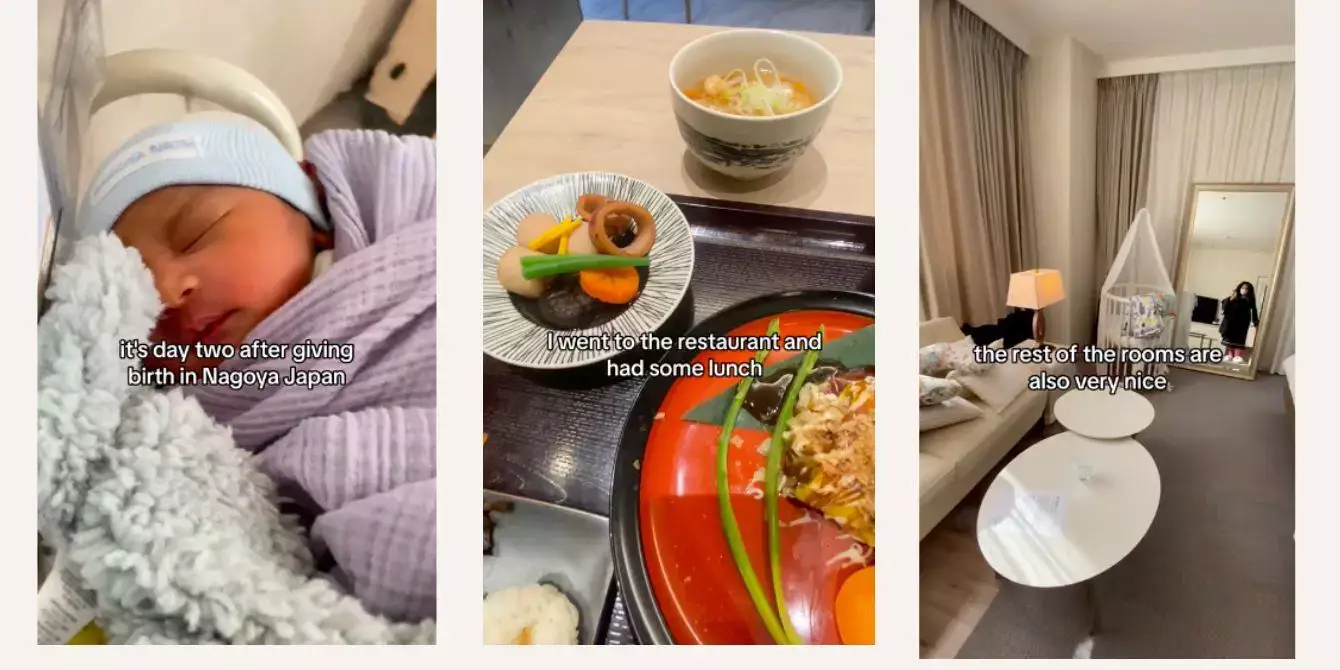The journey of motherhood varies greatly across different cultures, and the stark contrasts can be striking. One American mother, Nicole Patrice, has generated buzz on TikTok by sharing her remarkable birthing experience in Japan. After transitioning from Kentucky to Japan, she juxtaposed her experiences, highlighting the nurturing environment provided by Japanese healthcare systems as opposed to her prior distressing experience back home.
Nicole’s tale emphasizes the disparities in maternal care between the United States and Japan. Her initial experience in Kentucky was filled with distress and a sense of discrimination, which is not uncommon in the American healthcare narrative. Many mothers in the U.S. have voiced their frustrations over the organizational approach of hospitals, often lacking the emotional support critical during such a life-changing event.
In contrast, Nicole’s second birth at the Nagoya Birth Clinic stood out for its lavish approach, likened to a retreat rather than a conventional medical facility. The expectations of American hospitals typically involve swift discharge, bureaucratic red tape, and extensive medical bills, which often overshadow the emotional and physical needs of new mothers. Nicole’s experience, however, painted an idyllic picture of care, encouraging us to rethink the basic foundations on which maternal health is built in the U.S.
At the Nagoya Birth Clinic, Nicole was treated to an environment that promotes healing both physically and emotionally. This included a five-day stay in a luxurious suite, featuring ample amenities designed to foster relaxation and recovery. This starkly contrasts with the hurried atmosphere in many American hospitals, where mothers often feel rushed to leave before fully recuperating.
One of the highlights of Nicole’s experience was the food, which she described as “restaurant-worthy.” While many U.S. hospitals offer bland meals that often lack nutritional value, the meals at the Nagoya clinic were deliberately designed to aid healing post-surgery. Foods like onigiri, bibimbap, and other nutrient-rich options reflect Japan’s understanding of postpartum nutrition, knowing that recovery and lactation can significantly impact a new mother’s wellbeing.
Nicole’s comments about the cultural attitudes in Japan reveal a societal framework that prioritizes maternal wellness. While the world has been grappling with understanding and effectively equipping new mothers, Japan’s clearly defined support structures prompt reflection. For Nicole, the environment allowed for not only physical healing but also emotional bonding with her newborn, Jonah.
The hands-on approach taken by the clinic staff, who ensured that mothers had the time and space to bond with their babies, highlights an integral aspect often overlooked in U.S. birthing practices. Many American mothers leave the hospital before fully enhancing this crucial connection, often feeling stressed and overwhelmed by the impending responsibilities of motherhood. As Nicole described, the emphasis on nurturing and rest in Japan allowed her to focus on bonding rather than worrying about the next bills and logistics associated with her care.
What’s truly astounding is that Nicole’s sumptuous experience—and all its benefits—came at a cost of less than $3,000. This raises questions about the economic model of maternal care in the United States, where hospital bills can easily escalate into tens of thousands of dollars. The value placed on maternal healing in Japan, alongside its high-quality care standards, begs the question: Why can’t the U.S. adopt similar frameworks that are both humane and financially sustainable?
The fundamental perception that surrounds childbirth and recovery ought to shift from viewing it as a medical process to recognizing it as a crucial life phase deserving of comprehensive support—in both emotional and financial terms.
Nicole’s journey serves as both a celebration of motherhood and a clarion call for reflection and reform. As more voices emerge to share their experiences and advocate for a shift in perspective, could it be that the U.S. will begin to take inspiration from Japan’s nurturing ethos towards childbirth? Every mother deserves not only competent medical care but also a supportive environment that celebrates and aligns with the profound transitions of bringing life into the world.

